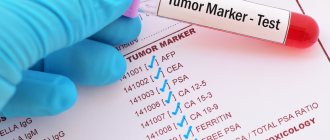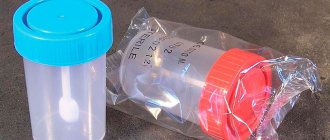Malignant tumors, including gastrointestinal cancer, are diagnosed in the majority of patients who seek medical help. The danger of this disease lies in the difficulty of diagnosing it at an early stage. Symptoms often appear too late. Occasionally, during a preventive examination, it is possible to suspect a pathology, then the patient is referred for tests.
By analyzing tumor markers for intestinal and rectal cancer based on their level, the doctor can determine the disease, its nature and stage.
Types of tumor markers for colon cancer
Among the proteins that indicate problems with the gastrointestinal tract, there are 2 groups:
- Specific – identifying tumor formations in a specific place in the body.
- Nonspecific - detect oncology, but do not record localization.
The first group includes the following tumor markers:
- Carbohydrate antigen (CA 242)
- shows cancerous pathology of the colon, rectum or pancreas at an early stage. The study makes it possible to determine how the tumor will behave over the next five months. - Carcinoembryonic antigen
- is responsible for detecting oncology in the rectum. Analysis of the study results allows us to talk about the nature of the cancer, the dynamics of the increase in tumor size, and calculate the period of disease progression. Using CEA, oncologists evaluate the effectiveness of therapy and determine the risk of relapse. - SA 72-4 is prescribed as an addition to REA.
This tumor marker is found in malignant cells of the lungs and colon if small cell cancer occurs. Colorectal pathology is also determined using this antigen. - Tu M2-RK (the second name is the tumor marker of choice)
- allows you to identify all metabolic processes occurring in cancer cells. This type of study is prescribed for specific metabolic indicators. It helps to identify oncological tumors of the gastrointestinal tract, including carcinoma.
The group of nonspecific markers includes the following indicators:
- Alpha-fetoprotein (AFP) - manifests itself as an increase in the content of α-fetoprotein, which indicates the appearance of a tumor-like neoplasm in the rectum and sigmoid colon.
- CA 19-9 is a marker that determines cancer pathologies of the large intestine, bile ducts and bladder itself, esophagus, and pancreas.
- CA 125 - using this indicator, the pathological process that has arisen in the sigmoid colon, leading to the formation of a tumor, is determined.
- CYFRA 21-1 - high values for this marker indicate the presence of a malignant lump in the rectum.
- SCC - helps to detect the presence of cancerous pathologies of the anal canal.
- LASA-P - increased antigen content gives a signal about the suspected occurrence of a malignant process in other parts of the intestine.
Indications for analysis
The oncology department employs experienced and qualified specialists who always check tumor markers of the gastrointestinal tract if patients have the following symptoms indicating the possibility of the disease:
- pain and discomfort in the stomach and abdominal area;
- sudden weight loss that occurs without any reason;
- difficulty swallowing food and severe heartburn after eating;
- lack of appetite due to increased fatigue of the body.
In addition, we check tumor markers of the gastrointestinal tract to check the effectiveness of the chosen course of treatment procedures, as well as to monitor patients after treatment.
When are tests taken?
To determine the level of tumor markers, the patient donates blood as the biomaterial being studied. The sample collection procedure is carried out early in the morning. It is important that the patient does not eat for eight hours prior to the test. To get clear answers, doctors recommend refraining from drinking coffee, tea and juices, replacing them with water.
The results of the study will be ready a day or two after the collection of biological material. Tests to determine the level of protein antigen CA 72-4 are carried out taking into account the possible intake of biotin, since a daily dosage exceeding 5 mg will violate the veracity of the results. It is then recommended to postpone the study for 8 hours until the drug is removed from the body.
The level of Tu M2-RK is determined by analyzing stool. The specificity of this procedure is the prohibition of extracting biomaterial by enema or with the assistance of laxatives. Feces are obtained exclusively naturally. Results are issued after 7 days.
What are tumor markers?
A tumor biomarker is a substance (usually a protein molecule) produced either by the cancer cells themselves or by other cells of the body in response to cancer pathology.
Sometimes healthy cells in the body are able to produce such substances in response to certain benign (non-cancerous) conditions. Tumor markers provide information about a tumor, such as how aggressive it is, whether it can be treated with targeted therapy, and how well the tumor responds to treatment.
Tumor markers are proteins or other substances that are produced by cancer cells in higher quantities than normal cells. These biomarkers are found in blood, urine, stool, or other body tissues or fluids.
For some types of neoplasia, the level of a tumor marker reflects the stage (extent) of the disease and/or the patient's prognosis (the likely outcome or course of the disease). An example of this type of tumor marker is α-fetoprotein, which is measured in the blood to assess the stage, prognosis, and track response to treatment of germ cell tumors.
However, increasingly, genomic indicators such as mutated forms of genes, tumor gene expression patterns, or nongenetic changes in the DNA of cancer cells are being used as tumor markers.
Currently, about 60 tumor markers have been characterized in detail and are in clinical use. Some of them are associated with only one type of tumor (specific tumor markers), while others are associated with several types of cancer pathology (nonspecific tumor markers).
This number does not include tumor markers, which are tested using immunophenotyping and immunohistochemistry, which help diagnose cancer and distinguish between tumor types.
At the same time, a “universal” tumor marker that could detect the presence of any type of cancer pathology has not yet been discovered.
How and where to get tested
Tumor markers for stomach and intestinal cancer are detected by private or public laboratory workers. To do this, you must provide your biological material.
Preparation for analysis
Before proceeding to donate blood, the patient must carefully follow the recommendations issued by the oncologist for the allotted time to ensure reliable results. Measures to prepare for the procedure are as follows:
- For a week, exclude fried, smoked, fatty and sweet foods from your diet.
- Drink only water, neglecting other drinks.
In the morning, on an empty stomach, the patient must report to the laboratory, where a nurse will draw blood from a vein. Within a week, the biomaterial is studied, then the results are generated and presented. If a person was previously diagnosed with neoplasms of various natures, then monitoring for tumor markers should be carried out on a regular basis.
Advantages of the clinic
Our main advantages:
- High level of comfort. Our clinic has created a friendly atmosphere that promotes the healing process of patients who have been diagnosed with cancer.
- Professionalism of doctors. Tumor markers in the oncology laboratory are checked by experienced, highly qualified specialists.
- Convenient location. There are several metro stations near the clinic (Novoslobodskaya, Tverskaya, Chekhovskaya, Belorusskaya and Mayakovskaya).
What tumor marker shows bowel cancer?
Having received the test results in hand, you should take into account when studying the indicators that the data can be interpreted in different ways. It all depends on the laboratory in which the research was carried out. Different clinics use different measurement systems, so it is important to compare the obtained figures with generally accepted standards:
- CA 72-4 - does not exceed 6.3 IU/ml.
- CA 19-9 - up to 40 IU/ml.
- CA 242 - in the range of 0-30 IU/ml.
- CEA - no at all (0 IU/ml).
In some situations, tumor markers may be lowered. This indicates the absence of cancer, but the presence of possible damage to the kidneys or liver.
Colon cancer shows a combination of markers CA 242, CA 19-9 and RAE.
Video: Tumor markers for colon cancer
Nonspecific markers
Nonspecific markers are determined in various malignant tumors, and often in non-cancerous pathologies.
In colorectal cancer, several nonspecific tumor markers are more often used. Determining each of them has its own task - testing for sensitivity to a specific therapy, diagnosing relapses, monitoring the effectiveness of treatment
Examples of markers used in colorectal cancer.
Mutation of the DPD gene in the blood. Types of neoplasms: stomach, pancreatic, breast and colorectal cancer. Used to predict the risk of toxic reactions to 5-fluorouracil therapy.
BRAF V600 mutations in tumors. Types of neoplasms: cutaneous melanoma, Erdheim-Chester disease, colorectal cancer and non-small cell lung cancer. Used to select patients who are most likely to benefit from treatment with specific targeted therapies.
Mutation of the KRAS gene - in the tumor. Types of neoplasms: colorectal cancer and non-small cell lung cancer. Used to determine whether a particular type of targeted therapy is appropriate for treatment.
Advantages of contacting the City Medical Center
If you need to assess the state of your health and take timely measures to restore it, you can contact the City Medical Center. Our clinic is equipped with the latest equipment, which allows us to conduct laboratory tests in the shortest possible time and provide highly accurate diagnostic information. The specialists at our medical center are experienced, highly qualified doctors who are ready to help you regain your health and maintain your longevity. To schedule an examination, call or fill out the online form. If necessary, you can use and get tested without visiting the clinic. In addition, you have access to comprehensive diagnostic programs that include the entire range of laboratory and hardware examination methods.
Symptoms
One of the biggest problems in diagnosis is that this disease does not have specific signs - manifestations that would clearly indicate this disease. Therefore, it is important to see a doctor as soon as possible if you experience any symptoms of possible stomach cancer:
- Pain of various types in the epigastric region (pulling, aching, dull), which may or may not be associated with food intake.
- Dyspeptic symptoms after eating (heartburn, bloating, feeling of a “stone” in the stomach, belching, early satiety).
- Problems with swallowing food (a feeling that the esophagus is pinched or that there is a foreign body in it).
- Unexplained weight loss, loss of appetite up to its complete absence.
- Congestive vomiting (vomit contains fragments of food that was eaten the day before) or vomit with traces of blood.
- Very dark or black stool.
When else is it worth getting tested?
In addition, even in the absence of signs of trouble, regular preventive examinations and tests for tumor markers should be carried out under the following circumstances:
- Close relatives have a history of stomach or intestinal cancer, and there is a possibility that you have inherited a tendency to this disease.
- You have been diagnosed with stomach polyps - these benign neoplasms can transform into malignant ones over time.
- Chronic diseases of the stomach - they change the structure of the mucous membrane of this organ and are among the causative agents of cancer.
- Any immunity disorders - the immune system is the main and most powerful barrier to the transformation of healthy cells into cancer cells, therefore a long-term decrease in immunity puts a person at increased risk.











